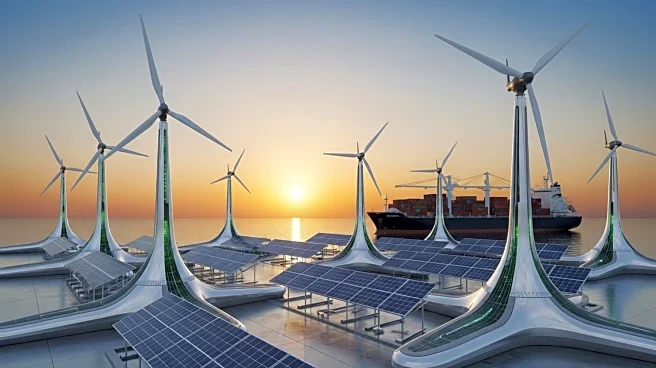What's Happening?
The Global Centre for Maritime Decarbonisation (GCMD) and the International Association of Ports and Harbours (IAPH) have entered into a two-year partnership to advance the decarbonization of the maritime sector. This collaboration aims to enhance the industry's readiness for transitioning to alternative fuels by addressing challenges and opportunities in bunkering, port infrastructure development, and regulatory frameworks. IAPH, with its network of over 200 port authorities and operators in more than 85 countries, will work alongside GCMD to leverage local expertise and facilitate safe pilots and trials for adopting low-carbon fuels. GCMD will conduct pilots across the value chain, develop risk-mitigation strategies, and establish operating procedures for new fuel deployment, such as ammonia bunkering and liquid CO2 offloading. The partnership seeks to close knowledge gaps and create globally applicable practices by tailoring findings to port-specific conditions and sharing results across multiple ports.
Why It's Important?
This partnership is significant as it addresses the urgent need for decarbonization in the maritime industry, a major contributor to global emissions. By focusing on alternative fuels and infrastructure development, the collaboration aims to reduce the carbon footprint of shipping operations, which is crucial for meeting international climate goals. Ports play a pivotal role in this transition, providing essential expertise and facilitating the adoption of new technologies. The partnership between GCMD and IAPH is expected to accelerate the industry's energy transition, reduce long-term investment risks in port infrastructure, and promote sustainable practices. This initiative could lead to significant environmental benefits and set a precedent for other sectors to follow in the global effort to combat climate change.
What's Next?
The partnership will focus on co-developing tools and strategies to assist ports, shipowners, and operators in adopting new bunkering fuels safely and efficiently. GCMD and IAPH will continue to refine existing tools and develop new ones to support the transportation of low- and zero-carbon fuels. The collaboration will also involve real-world pilot projects, such as GCMD's Project CAPTURED, which demonstrated the safe offloading of captured and liquefied CO2 in China. These efforts will be crucial in turning pilot learnings into scalable operations, essential for the maritime industry's energy transition. The partnership is expected to influence global practices and policies, encouraging other sectors to adopt similar decarbonization strategies.
Beyond the Headlines
The partnership between GCMD and IAPH highlights the growing importance of international collaboration in addressing climate change. By leveraging a global network of ports, the initiative underscores the need for shared knowledge and resources to tackle complex environmental challenges. The focus on alternative fuels and infrastructure development also raises ethical considerations regarding the equitable distribution of resources and technology across different regions. As the maritime industry undergoes this transition, it may face regulatory and cultural shifts that could impact global trade and economic dynamics. The partnership serves as a model for other industries seeking to balance economic growth with environmental sustainability.










